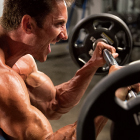Q: I’m thinking about taking a handful of basic exercises and working out three days a week. Is that a good idea for building my strength?
 A: It’s important to strive for gains in major multijoint exercises such as squats, bench presses and deadlifts, but it’s also possible to take the approach too far. For example, when athletes apply the principle of performing the most “bang for your buck” exercises, they often make the mistake of neglecting other valuable exercises. So, they may do the close-grip flat-bench press but won’t perform the same exercise on an incline. Or they will do standing barbell curls but not Scott reverse curls.
A: It’s important to strive for gains in major multijoint exercises such as squats, bench presses and deadlifts, but it’s also possible to take the approach too far. For example, when athletes apply the principle of performing the most “bang for your buck” exercises, they often make the mistake of neglecting other valuable exercises. So, they may do the close-grip flat-bench press but won’t perform the same exercise on an incline. Or they will do standing barbell curls but not Scott reverse curls.
These are the same individuals who will do the incline barbell press only if the bench angle is set at 45 degrees or less for fear of not appearing strong to their fellow lifters. So what! If your bench is set at 62 degrees, it is the recruitment of new motor units that counts. If you understand the concept of structural balance, you will not be afraid to train lifts that you are poor at, as you know that not training them will interfere with your progress.
Take the example of Ed Coan, a world champion and world-record holder who is considered one of the greatest powerlifters of his time. At one point in his career he made an impressive jump in his bench press performance, and when asked to what he attributed it, he replied that he had brought up his results in the behind-the-neck-press!
When you follow this principle, besides gaining muscle faster, you also will be more likely to remain injury free, as your strength will be balanced. Overuse of certain exercises leads to pathologies similar to repetitive-pattern conditions like carpal tunnel syndrome.
Don’t let your ego determine the pathway to your gains. Use sound training principles, such as the concept of structural balance, and you will get there faster.
Editor’s note: Charles Poliquin is recognized as one of the world’s most suc-cessful strength coaches, having coached Olympic med-alists in 12 different sports, including the U.S. women’s track-and-field team for the 2000 Olympics. He’s spent years researching European journals (he’s fluent in English, French and German) and speaking with other coaches and scientists in his quest to optimize training methods. For more on his books, seminars and methods, visit www.StrengthSensei.com. Also, see his in this issue. IM




















You must be logged in to post a comment Login